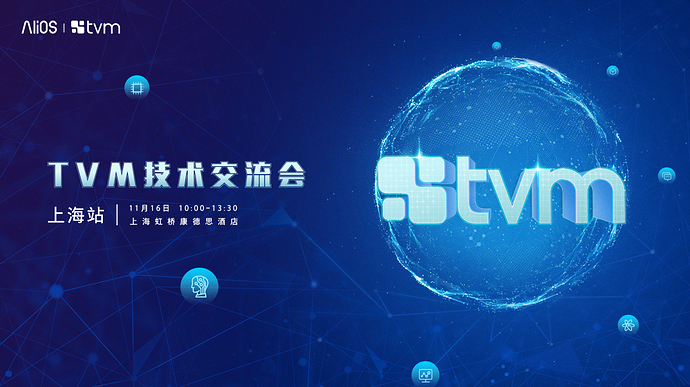Hi, We, Alibaba AliOS(https://www.alios.cn/) Team, are very pleased to host one TVM Meetup in Shanghai on Nov. 16.
The agenda is here (still be tuning):
10:00 - 10: 10 Opening (Yangqing Jia)
Talk:
10:10 - 10:40 Talk by @tqchen
10:40 - 11:05 TVM @ AliOS (TVM @ ARM CPU, GPU, Hexagon DSP) @FrozenGene
11:05 - 11:30 Break (We provide cake food, coffee…)
11:30 - 11:55 TVM @ vastaitech (TVM @ NPU) @glli @Qiu1981
11:55 - 12:20 AliNPU (Hanguang 800’s programming model and TVM)
12:20 - 12:45 TVM @ Alibaba PAI (TensorCore AutoGen and Mix Precision) @MinminSun
Lightning Talk:
12:45 - 12:50 TVM @ yearlink (TVM deployment) @dolphintear
12:50 - 12:55 TVM @ Alibaba AI Labs (HIFI4 DSP, ARM CPU, PowerVR GPU)
12:55 - 13:00 TVM @ Linaro (ARM platforms) @JammyZhou
13:00 - 13:05 TVM @ AWS (Deploying GluonCV models using TVM)
13:05 - 13:10 TVM @ Alibaba Chips Tool Team (Caffe frontend @ TVM)
13:10 - 13:15 How VTA can be deployed on Intel FPGA @liangfu
Max Seating capacity: 70. (Sorry…Sold out in just 4 hours…) You should provide the register qr code to enter into the meeting.
This meetup, I try my best to make it cover different aspects. From ARM CPU to NPU, from development to deployment. And special thanks @tqchen’s great support. Wish us enjoy this meetup.



 ).
).